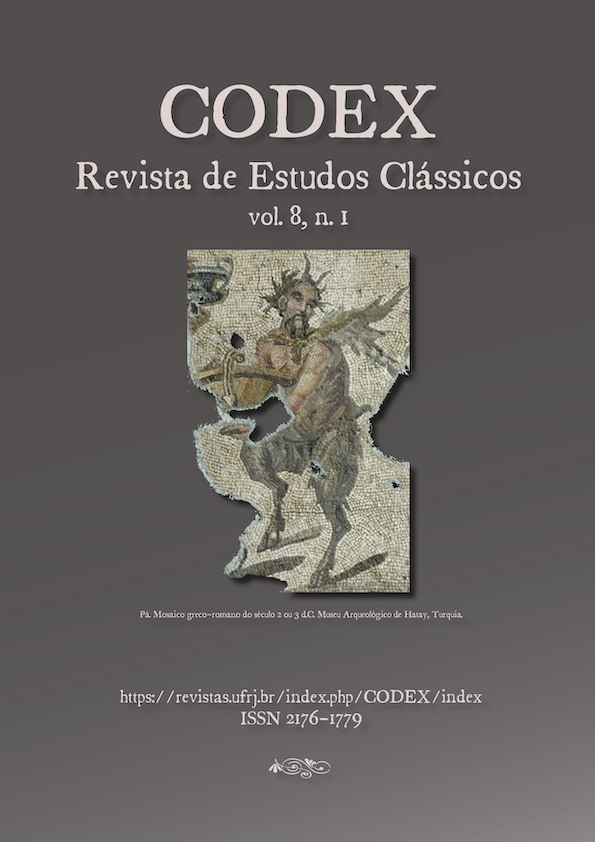Characterization and speech in Greek tragedy: the old man and the wife in the prologue of Euripides’ "Heracles"
DOI:
https://doi.org/10.25187/codex.v8i1.33631Keywords:
characterization, Euripides, Heracles, prologue, Amphitryon, MegaraAbstract
This paper investigates how speech – in particular the first one in a Euripides’ tragedy – contributes to characterization. This is an indirect, metonymical characterization, that was called ēthopoiia in Antiquity. Two characters are examied, Amphitryon and Megara, in the prologue of Euripides’ Heracles; it is argued that their characterization not only goes beyond a notion of “type” (the old man and the suffering wife), but articulates themes which importance becomes clearer only later on and at the same time plays with the form of the plot. It is shown that characterization and thought relate to each other to form an organic whole that makes the audience not only feel but also think about the emotions proper to the genre.
References
ALLAN, W. The Andromache and Euripidean tragedy. Oxford: Oxford University Press, 2000.
BATTEZZATO, L. Il monologo nel teatro di Euripide. Pisa, 1995.
BOND, G. Euripides: Heracles. Clarendon: Oxford, 1981.
BONIFAZI, A.; DRUMMEN, A.; de KREIJ, M. Particles in ancient Greek discourse: five volumes exploring particle use across genres. Washington, DC: Center for Hellenic Studies, 2016. Disponível em: https://chs.harvard.edu/CHS/article/display/6213#noteref_n.80
BRANDÃO, J. L. A (des)construção do herói (o problema da mediação no Héracles de Eurípides). Ensaios de literatura e filologia v. 5, 1987, pp. 113-75.
CROPP, M. J. Euripides: Electra. Introduction, translation and commentary. 2a ed. Oxford: Aris & Phillips, 2013.
DE TEMMERMAN, K.; EMDE BOAS, E v. (orgs.) Characterization in ancient Greek literature. Leiden: Brill, 2017.
DIGGLE, J. Euripidis fabulae. Vol. 1. Oxford: Clarendon, 1984.
DIGGLE, J. Euripidis fabulae. Vol. 2. Oxford: Clarendon, 1981.
DIGGLE, J. Euripidea. Oxford: Oxford University Press, 1994.
EGLI, F. Euripides im Kontext: Zeitgenössischer intellektueller Strömungen. Analyse der Funktion philosophischer Themen in the Tragödien und Fragmenten. München/Leipzig: Saur, 2003.
EMDE BOAS, E. van. Language and character in Euripides’ Electra. Oxford: Oxford University Press, 2017a.
EMDE BOAS, E. van. Euripides. In: DE TEMMERMAN, K.; EMDE BOAS, E. van. (orgs.) Characterization in ancient Greek literature. Leiden: Brill, 2017b, pp. 355-74.
EMDE BOAS, E. van.; RIJKSBARON, A.; HUITINK, L.; BAKKER, M. de. The Cambridge grammar of classical Greek. Cambridge: Cambridge University Press, 2019.
ERBSE, H. Studium zum Prolog des euripideischen Tragödie. Berlin: de Gruyter, 1984.
EURÍPIDES. Duas tragédias gregas: Hécuba e Troianas. Tradução e introdução: C. Werner. São Paulo: Martins Fontes, 2004.
EURÍPIDES. Teatro completo. Tradução: Jaa Torrano. Vol. 2. São Paulo: Iluminuras, 2016.
FALKNER, T. M. The poetics of old age in Greek epic, lyric, and tragedy. Norman / London: University of Oklahoma Press, 1995.
FRANCISCATO, C. R. Eurípides: Héracles. São Paulo: Palas Athena, 2003.
GRETHLEIN, J. Asyl und Athen: Die Konstruktion kollektiver Identität in der griechischen Tragödie. Stuttgart; Weimar: Metzler, 2003.
HALLIWELL, S. Between ecstasy and truth: interpretations of Greek poetics from Homer to Longinus. Oxford: Oxford University Press, 2011.
HOMERO. Ilíada. Tradução e ensaio introdutório: C. Werner. São Paulo: SESI-SP / Ubu, 2018a.
HOMERO. Odisseia. Tradução e introdução: C. Werner. Apresentação: R. Martin. São Paulo: Ubu, 2018b.
KOVACS, D. Euripidea altera. Leiden: Bril, 1996.
KROEKER, E. Der Herakles des Euripides: Analyse des Dramas. Giessen: Tese de doutorado, 1938.
LLOYD, M. Euripides: Andromache. Introduction, translation, and commentary. Warminster: Aris & Phillips, 1994.
MASLOV, B. Pindaric temporality, Goethe’s Augenblick, and the invariant plot of Tiutchev’s lyric. Comparative literature v. 64, 2012, pp. 356-81.
MASTRONARDE, D. J. Review article: Euripides’ Heracles. EMC v. 27, 1983, pp. 93-116.
MATTHIESSEN, K. Euripides, Hekabe: Edition und Kommentar. Berlin: de Gruyter, 2010.
MICHELINI, A. N. Euripides and the tragic tradition. Madison/London: University of Wisconsin Press, 1987.
NÜNLIST, R. The ancient critic at work: terms and concepts of literary criticism in Greek scholia. Cambridge: Cambridge University Press, 2009.
PAPADOPOULOU, T. Heracles and Euripidean tragedy. Cambridge: Cambridge University Press, 2005.
RENEHAN, R. Review article: a new commentary on Euripides. Classical Philology v. 80, n. 2, 1985, pp. 143-175.
SCHADEWALDT, W. Monolog und Selbstgespräch: Untersuchungen zur Formgeschichte der griechischen Tragödie. Berlin: Weidmann, 1926.
SILK, M. S. Nestor, Amphitryon, Philocleon, Cephalus: the language of old men in Greek literature from Homer to Menander.” In: MARTINO, Francesco de; SOMMERSTEIN, Alan. H. (org.) Lo spettacolo delle voci. Le Rane 14. Bari: Levante, 1995.
SNELL, B; MAEHLER, H. Pindarus. Fragmenta. Leipzig: Teubner, 1975.
STROHM, H. Zur Gestaltung euripideischer Prologreden. Grazer Beiträge v. 6, 1977, pp. 113-32.
VERDENIUS, W. J. Notes on Heracles vv. 1-522. Mnemosyne v. 40, 1987, pp. 1-17.
VIVANTE, P. On time in Pindar. Arethusa v. 5, n. 2, 1972, pp. 107-31.
WERNER, C. Andrómaca de Eurípides: El prólogo y la noción de unidad en la Poética de Aristóteles. Synthesis v. 22, 2015, pp. 1-19.
WERNER, C. Memórias da Guerra de Troia: a performance do passado épico na Odisseia de Homero. Coimbra: Imprensa da Universidade de Coimbra, 2018a.
WERNER, C. As especulações de Andrômaca em Troianas de Eurípides. Anais de Filosofia Clássica v. 12, n. 23, 2018b, pp. 13-30.
WERNER, C. Formas da tukhē (“fortuna”) na Olímpica 12 de Píndaro e no Héracles de Eurípides. In: In: GAZONI, F.; FERREIRA, P.; SAMPAIO, V. A celebração dos Jogos Olímpicos na Antiguidade. São Paulo: Odysseus, no prelo a.
WERNER, C. Novas formas do herói e do divino no Héracles de Eurípides. In: COELHO, M. C.; CORNELLI, G. (org.) Deuses, homens e heróis. No prelo b.
WILAMOWITZ-MOELLENDORFF, U. Euripides Herakles. Vol. 3. 2ª ed. Berlin: Akademie, 1959.
Downloads
Published
How to Cite
Issue
Section
License
This work is licensed under a Creative Commons Attribution-NonCommercial 4.0 International License.










